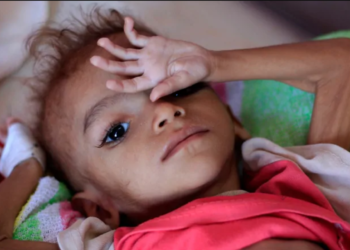An unlikely state has seemingly emerged as the global leader in women’s sexual and reproductive autonomy – Ukraine.
Last month, the United Nations Population Fund released their comprehensive State of World Population 2019 report, aptly titled, Unfinished Business: The Pursuit of Rights and Choices for all. For the first time, this annual report examined data on three areas of women’s choice: sexual intercourse with their partner, contraception use and health care.
For access to women’s sexual and reproductive health and rights, the data suggests that women in Ukraine and the Philippines enjoy the most empowerment, with 81 percent of women able to make these choices for themselves.
The Guttmacher Institute, a leading institution examining women’s reproductive rights, found similarly high levels of women’s reproductive rights in Ukraine across a variety of related factors.
Notably, the report found that 90 percent of women in Ukraine demonstrate comprehensive knowledge of HIV prevention methods. According to Judyth Twigg, Senior Associate at the Center for Strategic and International Studies, there were zero cases of mother-to-child transmission of HIV in 2016.
Ninety-three percent of women in Ukraine have their demand for contraception satisfied and 82 percent of women were able to make an informed choice about their contraceptive method as a result of the information they received from their health care providers.
“By 2007 Ukraine had adopted a very progressive National Reproductive Health Programme and had been making considerable progress in decreasing maternal and new-born mortality and abortion rates, and in increasing contraceptive use as well as awareness and information availability regarding modern contraception methods and reproductive rights,” Jens-Hagen Eschenbächer, UNFPA Regional Communications Adviser for Eastern Europe and Central Asia, told The Globe Post.
In #Ukraine, teen girls use #Skype to access free counseling services on reproductive rights — http://t.co/uKQXU58Xwb #GirlsinICT Day
— Beyond Access (@Beyond_Access) April 24, 2014
Limitations of the Data
Despite Ukraine’s progressive agenda for women’s sexual and reproductive rights, it is important not to lose sight of the big picture when taking a note of the U.N.’s leading designation.
Previously, the U.N. HeforShe initiative has cited Ukraine’s “systematic gender inequality,” due to “deeply rooted systematic gaps,” including “weak rule of law, low capacity of the institutional mechanisms for gender equality and lack of political will.”
And just this year, Freedom House, a research and advocacy organization on democracy, political freedom, and human rights, cited Ukraine’s challenging civil society climate, noting that “Attacks against journalists, civil society activists, and members of minority groups are frequent and often go unpunished.”
It may seem counterintuitive that a nation with limited civil liberties and pervasive gender inequality should serve as one of the two global leaders in women’s access to reproductive justice.
A closer look at the UNFPA data, however, reveals that Ukraine cannot accurately hold that title, and neither can the Philippines.
The data for the indicator called “Decision making on sexual and reproductive health and reproductive rights, per cent” was conducted by Demographic and Health Surveys (DHS) from the United States Agency for International Development, and excluded all high-income countries, as well as many middle-income ones.
And according to Eschenbächer, the 81 percent figure cited in the UNFPA report “is over ten years old and would have to be verified to be meaningful in the current context.”
The UNFPA claim in the press release that “Women’s sexual and reproductive autonomy was greatest in two countries: the Philippines and Ukraine, where 81 percent of women are empowered to make these decisions for themselves,” should have included an explanation of the methodology to avoid misrepresentation of both the nations surveyed and the data’s tenure.
Our collective challenge is to finish the #UnfinishedBusiness of ensuring rights and choices for all.
Check out our newly released State of World Population 2019 Report for more: https://t.co/J0NsAo8zA2#StandUp4HumanRights #SWOP2019 pic.twitter.com/ehJqz1KRL7
— UNFPA (@UNFPA) April 10, 2019
Progress
While the status of Ukraine as the leader in women’s sexual and reproductive rights and health may invite some questions, the 81 percent figure should not be understated.
Ukraine continues to expand its healthcare sector to better suit the needs of women.
“The development of a new comprehensive reproductive health programme is an important step that the Ministry of Health of Ukraine is currently undertaking, which will help to build on the achievements made so far to improve the quality of reproductive health services,” WHO Representative Everard said.
With a first phase roll out in 2018, under the leadership of Acting Health Minister Ulana Suprun, monumental new reforms seek to restructure and refinance the healthcare industry to better incentivize citizens to seek primary, secondary care; and tertiary care as needed. Medical aid related to pregnancy and labor is expected to be covered by the state beginning in 2020.
Adjacent to the rise of greater wrap around medical services to Ukrainian women, the rise of civil society in recent years has improved access to information – a key determinant of women’s sexual and reproductive rights and health. Some 49–52 percent of 15-19 year old women enjoying weekly exposure to family planning message in the media and a steep 85 percent of Ukrainian women attend secondary-school, a key source of sexual education.
“Women in Ukrainian society traditionally assume key decision-making roles with regard to all aspects of family health, in comparison to men who tend to display more limited health-seeking behavior patterns,” Eschenbächer explained.
Ukraine Wrestles With Measles as Cases Rise 300 Percent Worldwide






















